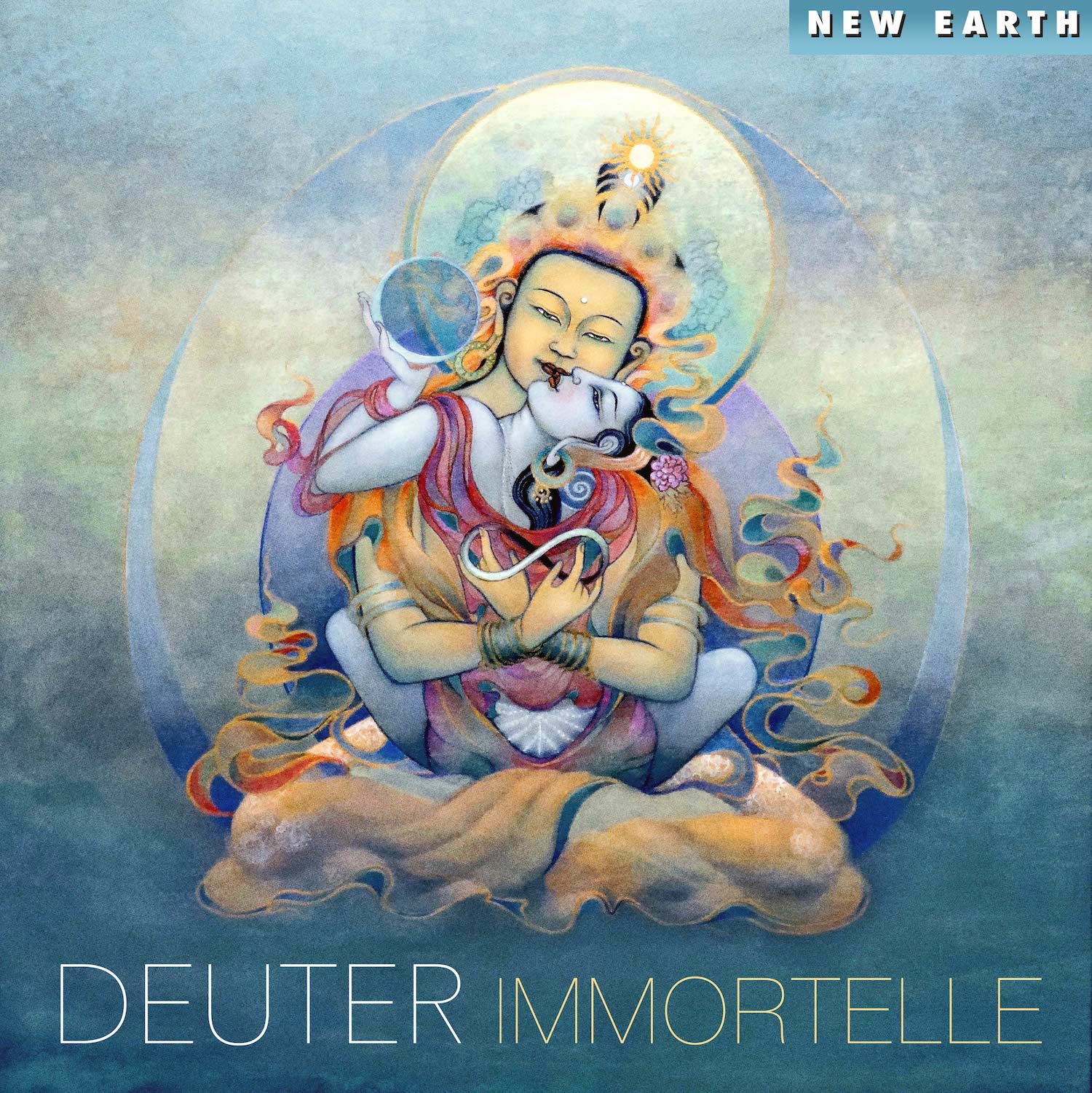[hmp_player playlist=’Immortelle’]
Stream
Album Description
Deuter, who received the prestigious Zone Music Reporter “Lifetime Achievement Award” in 2016, has created Immortelle, a new album inspired by nature and dedicated to healing. Deuter named each tune on the album after a medicinal plant that has helped humanity for millennia.
Deuter — who lives and works in the forested mountains just beyond the high desert of Santa Fe, New Mexico — gets much inspiration from nature on a daily basis. When he was younger, the German-born musician traveled extensively around the world studying people, places, cultures, plants, music and alternative healing therapies.
“Nature has always been an inspiration for me,” says Deuter. “Its influence can be heard directly on my CDs when I have included the sounds of bird songs, crickets, mountain streams and ocean waves. The title of the new CD as well as the titles of the individual tracks are all names of plants and flowers which have, with their healing powers, helped humans for thousands of years. The plants also always made life a little more pleasant with their aroma.”
For Immortelle, Deuter plays a variety of instruments including the flutes, keyboards, cello, piano and guitar. He also softly mixes in his own voice as an extra instrument to add humanness and touch the hearts of listeners. Some of the other sounds he creates for this album include violin, strings, harpsichord, chimes, harp and hand drums.
Deuter has released more than 60 albums during his career. Immortelle and many others can be found as CDs in music stores and new age lifestyle shops across the United States as well as online, while digital downloads of his music are available at all the major internet stores such as iTunes and Amazon. For more information about Deuter and his recordings, go to NewEarthRecords.com or DeuterMusic.com. Recent Deuter albums have gone high on the international Zone Music Reporter Chart.
Deuter is one of the founding fathers of new age music with his first album released in 1971. The majority of his works are intended to accompany various healing and spiritual practices such as yoga, Reiki, meditation, dreaming and massage. Through feeling, awareness and experience, as well as constant inspiration from the natural world around him, he creates music that transports the listener to a space of peacefulness and well-being.
“In my understanding, music is a horizontal journey. It needs time to unfold and it is also limited by time. But in addition, good music creates a vertical journey where it transcends time and keeps on going indefinitely into higher octaves,” Deuter explains.
“‘Immortelle’ is a word that few may know. It was unknown to me until I first went to Corsica where I became acquainted with this wonderful medicinal plant, the aroma of its oil and its strong invigorating effect. I enjoyed helping my friends distill an essential oil from it that provides protection, healing and renewal of the skin. The fragrance still brings back memories of mountains, warm rocks and views of the sea in Corsica,” remembers Deuter.
The tune “Monarda,” with its lovely cello part, is named after a mint plant also known as “bee balm,” “horsemint” or “Oswego tea.” The leaves give spicy fragrant essential oil used for stomach ailments, fever and as an antiseptic for mouth infections. “Sonnenbraut,” also known as “sneezeweed” and “Ruby Tuesday,” has some herbal uses in small doses. The ten-minute piece on the album with the same name features several flute parts and a beautiful violin solo. “Traubensilberkerze” is a flowering herb (also known as “black snakeroot” or “bugbane”) long used for menopause symptoms.
“Lily of the Valley” is a herbaceous poisonous plant used very carefully for folk remedies. Because of its bell-shaped flowers it is also called “Mary’s Tears” or “May Bells.” The tune “Vervain,” which focuses on flute and strings, is named after a plant with a bitter taste used for congestion, back pain and arthritis. The “Binsuga” plant is listed in Hildegaard von Bingen’s famous 12th Century writings on healing plants, and Deuter’s musical tribute is very slow and ambient. “Cumara” is a tree that can live more than a thousand years, but it also is in the pea family and produces seeds known as tonka beans that are used as a vanilla substitute. The “Cumara” music has piano, synth and wordless vocals.
Born in Falkenhagen, Germany, Deuter (pronounced doy-tur) remembers that “one of the nicer memories I have was the first time I heard someone play the flute. It was like a light coming the heavens. For one of my birthdays I was given a flute and that was the beginning for me.” He taught himself to play the flute, guitar, harmonica and “just about every instrument I could get my hands on.” Deuter experimented early on with combining acoustic and electronic elements with ethnic instrumentation and nature sounds, such as whale and bird songs, ocean waves, wind in the trees, and more. “I was born in the countryside and my first memories are of nature, of sitting in the woods and enjoying being alive. I started to record the sounds of nature, then mix them together. The next logical step was to play an instrument on top of it. This was the type of music I wanted to hear — relaxing, soothing and harmonious — but I could not find it anywhere, so I started to make this style of music myself.” His first album in 1971, titled D, helped define the emerging genre of music known as new age, and showed the beginning of Deuter’s spiritual path.
During the 1970s and 1980s Deuter, after travelling extensively in Asia in search of spiritual and creative inspiration, settled for a long time in Pune, India, for spiritual study. While there he produced a series of music tapes to be used in “active meditations,” in which he merged Indian classical motifs, fiery drums, loops, synthesizers, bells and pastoral acoustic passages. In 1985 he relocated to Santa Fe, New Mexico where he signed with New Earth Records and furthered his ascension into the top ranks of new age musicians worldwide.
Deuter’s recordings are too many to list here, but include early classics such as Kundalini Meditation Music (1975), Tea from an Empty Cup (1975), Ecstasy (1978), Silence Is the Answer (1981), Cicada (1982) and Nirvana Road (1984) as well as more recent best-sellers including Inside Hypno Relaxation (1994), Terra Magica: Planet of Light (1994), Wind & Mountain (1995), Nada Himalaya Tibetan Bells (1997), Reiki Hands of Light (1998), Like the Wind in the Trees (2002), Koyasan: Reiki Sound Healing (2007), Spiritual Healing (2008), Notes From a Planet (2009), Mystery of Light (2010), Flowers of Silence (2012), Dream Time (2013), Reiki Hands of Love (2015) and Illumination of the Heart (2015).
Deuter creates his music in his home studio hidden deep in the New Mexico forest that he shares with birds, deer, bears, roadrunners, snakes and coyotes. The sound of wind chimes and bees fill the air because Deuter also is a beekeeper. Between studio sessions, he spends his time reshaping his pond or crafting zen-like furniture in his workshop. Deuter describes himself as a hermit/monk/wolf living in the wild and enjoying it, staying close to nature. He designed his house using the principles of Feng Shui. The studio, with its large windows and views of the forest, is both a sanctuary and a laboratory for music-making that includes instruments from all over the world. He continues to learn and master an ever-expanding array of instruments including piano, various keyboards and synthesizers, guitars, shakuhachi flute, cello, koto, sitar, tabla, Turkish sasz, Persian tar, santoor, bazuki, Tibetan singing bowls, chimes, drums, ethnic percussion and more. “For me all the instruments I’m using are basically like colors in a painting,” states Deuter. “I’m not focused on one instrument specifically. I use many sounds and instruments so that it is like painting with sound.”
He also says, “My Immortelle album is an expression of gratitude to the nature of our planet with the understanding that the smallest flower may have healing powers.”
Track Info
1. Monarda 5:30
2. Sonnenbraut 10:15
3. Traubensilberkerze 10:12
4. Lily of the Valley 7:22
5. Vervain 7:05
6. Binsuga 5:25
7. Immortelle 6:52
8. Cumaru 6:55
Total Time: 60:00






